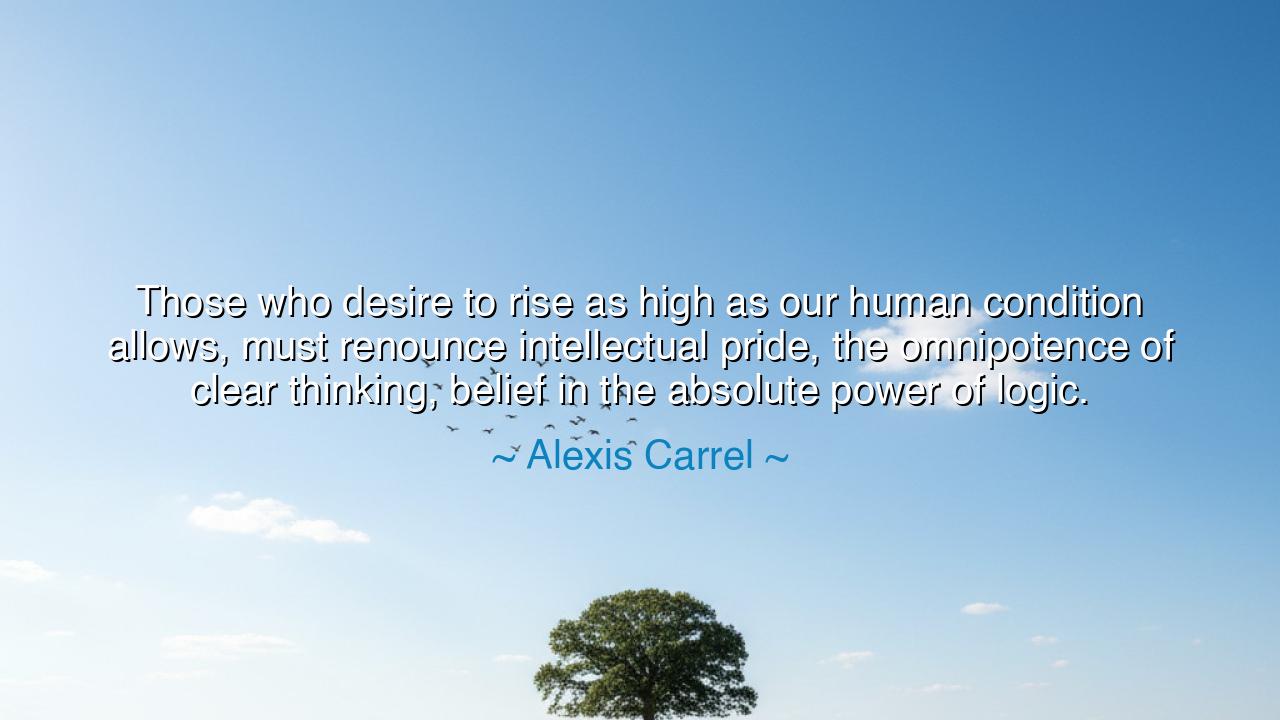
Those who desire to rise as high as our human condition allows
Those who desire to rise as high as our human condition allows, must renounce intellectual pride, the omnipotence of clear thinking, belief in the absolute power of logic.






Alexis Carrel, scientist and seeker of life’s mysteries, once declared: “Those who desire to rise as high as our human condition allows, must renounce intellectual pride, the omnipotence of clear thinking, belief in the absolute power of logic.” In these words, he delivers a profound warning to the children of reason: that logic alone, though noble, cannot carry the soul to its highest place. To rise beyond mere cleverness, man must surrender his intellectual pride and embrace the vastness of life, which transcends the cold measure of thought.
The heart of this wisdom lies in humility. Clear thinking is a gift, but when worshiped as a god, it blinds rather than enlightens. The absolute power of logic is an illusion, for there are realms where logic falters: the mysteries of love, of death, of the divine. Carrel calls us to remember that the mind, though sharp, is not infinite, and that to rise toward true greatness, we must kneel before mystery and admit our limits.
History offers striking examples. René Descartes, father of rationalism, sought to build all knowledge upon the certainty of thought: I think, therefore I am. Yet even he, in the end, confessed that reason alone could not account for God, for spirit, for the deepest truths of existence. His successors, who worshiped logic without humility, fell into dry systems that explained much but inspired little. It was the poets and saints, no less than the philosophers, who carried humanity upward.
So too in the life of nations. The French Revolution began with faith in pure reason. Temples of “Reason” were built, old beliefs cast aside, and the omnipotence of clear thinking was enthroned. But pride in logic soon descended into terror, for reason without humility is merciless. Only when tempered by conscience and compassion does the human spirit rise instead of fall.
O children of tomorrow, take Carrel’s counsel as sacred: cherish logic, but do not idolize it; sharpen your mind, but humble your heart. The summit of human greatness is not reached by intellect alone, but by the union of thought with reverence, reason with love, knowledge with mystery. Renounce intellectual pride, for pride makes the wise foolish; embrace humility, and you shall rise as high as the human condition allows.






TAtuan anh
I wonder if this quote is suggesting that those who reach the highest levels of human potential must learn to acknowledge that not everything can be understood through logic alone. But how do we define this 'higher' state? Is it emotional, spiritual, or intellectual? The idea of renouncing the ‘omnipotence’ of clear thinking could imply that there’s wisdom beyond the mind. Does this mean that those who rely solely on logic are limiting themselves in their quest for a fuller understanding of life?
TAPham Le Thuy Anh
This quote made me pause for thought. If we accept that intellectual pride can hinder us, does that mean we should embrace ignorance or relinquish our analytical abilities altogether? It sounds like Carrel is calling for a balance between intellect and humility. But how do we know when to let go of logic and adopt a more intuitive approach? Could intellectual rigor sometimes stifle creativity and personal growth? Where’s the line between intellect and humility?
QMNguyen Quang Minh
I’m not sure I completely agree with this perspective. Yes, intellectual pride can be a barrier, but isn’t there also strength in clear thinking and logic? The idea of renouncing belief in the power of logic feels a bit too extreme for me. Are we meant to ignore reason when faced with complex decisions? Can we rise to our highest potential without logic at some point, or is it just about knowing when not to rely on it too much?
THGiap Thi Ha
This quote seems to suggest that a true ascent in life requires us to step away from an over-reliance on reason and intellect. While I see the value in avoiding arrogance, it also seems dangerous to completely dismiss logic. Can we really move forward in life without a clear thought process guiding us? How do we balance intellectual humility with the need for structured thinking? Wouldn’t we be lost without the clarity logic provides?
MTNguyen Manh Tuan
I’m curious about this idea of renouncing intellectual pride. Does that mean we should stop valuing reason and logic altogether? Logic has done wonders in science and problem-solving, but is there a point where it might limit us, especially when it comes to more existential or spiritual matters? I wonder if there are moments where the heart or emotions can lead to insights that pure intellect can't. Is it really possible to rise without logic in certain areas of life?